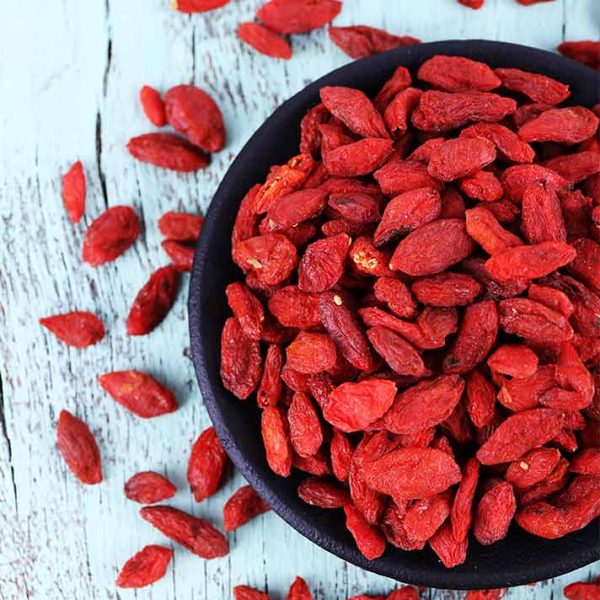Studies have shown that the fruit of Goji (Lycium barbarum, L. chinensis) may help male infertility by increasing sperm count and motility. In a Chinese study of 42 men diagnosed with infertility due to low sperm count and motility, the men were given 1/2 ounce of Goji berry a day. After 2 months of treatment, 33 of the men tested again had increased sperm counts to normal or above normal averages (20 million sperm per mL of semen) and all of those men went on to father children.
Animal studies back this human trial, showing that Goji protects sperm from hyperthermia (overheating), while increasing hormone levels and sperm quantity and quality. In one study scientists theorize that hyperthermia damages sperm health through oxidative stress. Oxidation causes an increase in free-radical damage to the sperm, including damage to the DNA in sperm cells. Goji contains antioxidants, which helped to reverse the effects of free-radical damage to the sperm.
Goji: Powerful Antioxidant
Lycium barbarum goes by the other common names Wolfberry, Chinese Wolfberry, and Matrimony vine. Goji has been used as a traditional male fertility herb for thousands of years in Traditional Chinese Medicine. These studies have shown that Goji truly is healthy for male fertility! The powerful antioxidants within the Goji fruit may also be protective for female egg health as well. Some studies have suggested its use for Premature Ovarian Failure patients as well as patients with autoimmune related fertility issues.
According to TCM Goji enhances sexual desire, improves sexual performance, and is nutritive to the kidneys, liver, and blood.
Japanese traditional healers use goji for spermatorrhea. Spermatorrhea is where there is involuntary discharge of semen without orgasm.
One animal study showed that Lycium barbarum extracts significantly reduced blood glucose levels, serum total cholesterol (TC), and triglyceride (TG) concentrations, while at same time markedly increasing high density lipoprotein cholesterol (HDL-c) levels after 10 days treatment. Water (decoction) and alcohol extracts of the fruit exerted a stronger antioxidant effect than the fruits alone. This is promising news for women who suffer from insulin resistant PCOS or couples struggling with infertility related to diabetes.
Goji fruit has been found to regenerate liver cells and protect them from damage by medications and hepatotoxic chemicals. Liver health has been shown to be very important for maintaining hormonal balance. The liver helps to filter toxins from the body, including excess hormones.
Goji is Delicious!
If you have never eaten Goji fresh or as a dried berry, you are missing out on one of the many pleasures of life. I love Goji berries and could eat them daily! They can be added to soups, oatmeal, porridge, smoothies, muffins, bread, and rice. They are excellent juiced, though you may have to purchase a premade juice separately, as they only grow in limited quantities in the United States. Last summer I found fresh Goji fruit at a farmer’s market in western Colorado! I ended up purchasing a couple cartons and my kids ended up eating most of them. They are a nutritious, delicious, and a beautiful addition to any meal!
Lycium is native to China, naturalized in Hawaii, and has a related species growing in the southwestern United States. It is in the Solanacea family, which is the nightshade family. If you know you are allergic to plants in the nightshade family avoid this plant.
Traditional Suggested Usage
Tincture: 60-90 drops up to 4 times a day
Decoction: 2 tsp dried fruit (berries) to 12 ounces water. Bring to a boil, lower heat to slow simmer, 15-20 minutes. Take off heat, let steep for additional 40-50 minutes. Up to 3 cups a day.
As a food, up to 1 ounce may be eaten per day.
Goji is not just for men, it has such great overall nutritional benefits that both men, women, children and the elderly may all benefit from eating this food.
- Watson, L. (2018, December 20). Fertility and Chinese Medicine. Retrieved from: http://drlisawatson.com/fertility-and-tcm
- Luo, Q., Li, Z., Huang, X., Yan, J., Zhang, S., & Cai, Y. (2006). Lycium barbarum polysaccharides: Protective effects against heat-induced damage of rat testes and H2O2-induced DNA damage in mouse testicular cells and beneficial effect on sexual behavior and reproductive function of hemicastrated rats. Life Sciences, 79(7), 613-621. doi:10.1016/j.lfs.2006.02.012. Retrieved from: https://www.sciencedirect.com/science/article/abs/pii/S0024320506001226?via%3Dihub
- Luo, Q., Cai, Y., Yan, J., Sun, M., & Corke, H. (2004). Hypoglycemic and hypolipidemic effects and antioxidant activity of fruit extracts from Lycium barbarum. Life Sciences, 76(2), 137-149. doi:10.1016/j.lfs.2004.04.056. Retrieved from: https://www.sciencedirect.com/science/article/abs/pii/S0024320504007829?via%3Dihub
- David Winston and Steven Maimes (2007). Adaptogens Herbs for Strength, Stamina, and Stress Relief. Healing Arts Press.
- Andrew Chevallier (1997) The Encyclopedia of Medicinal Plants, DK Publishing





